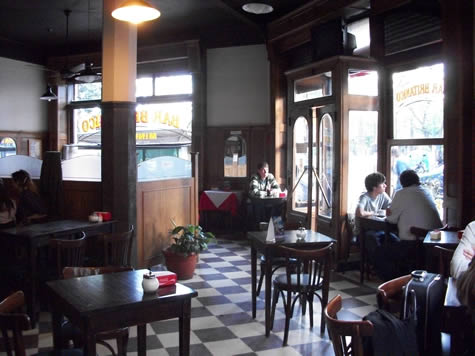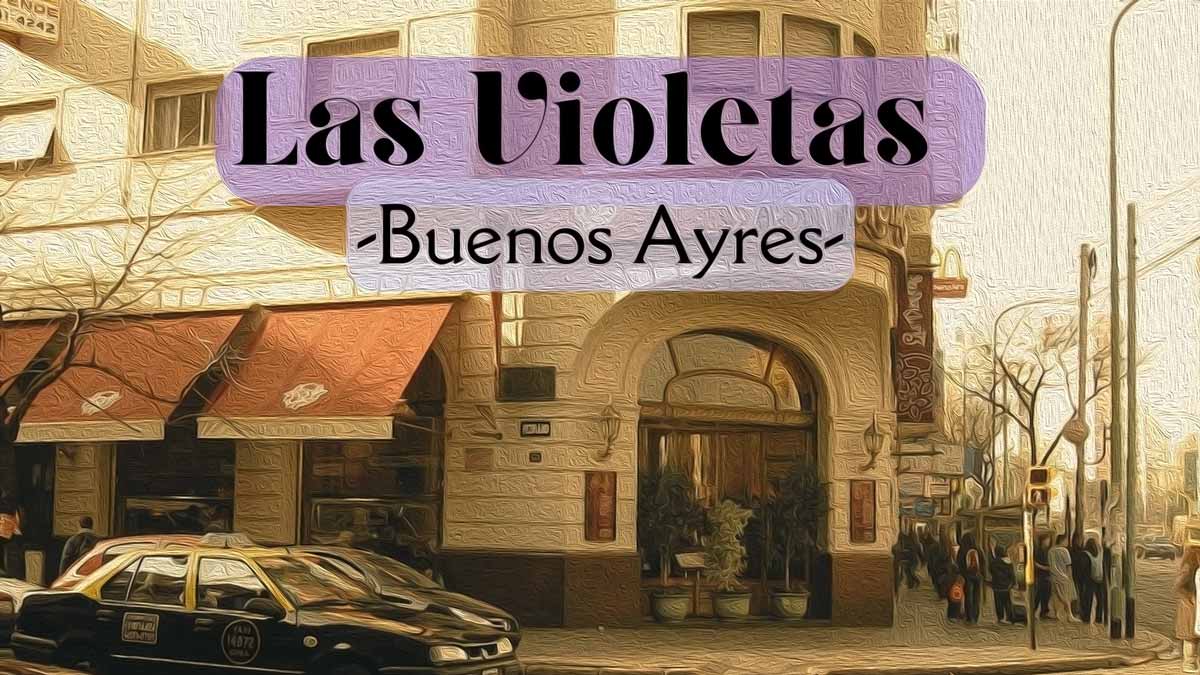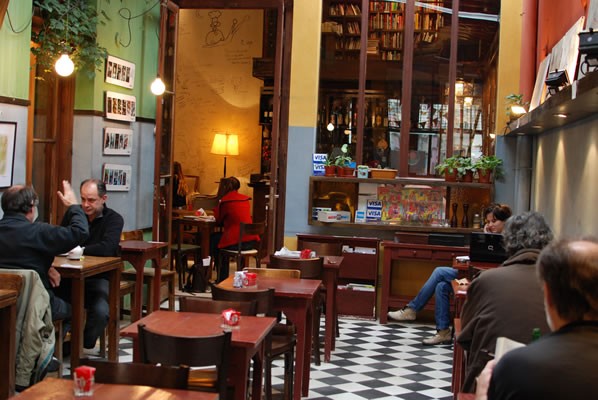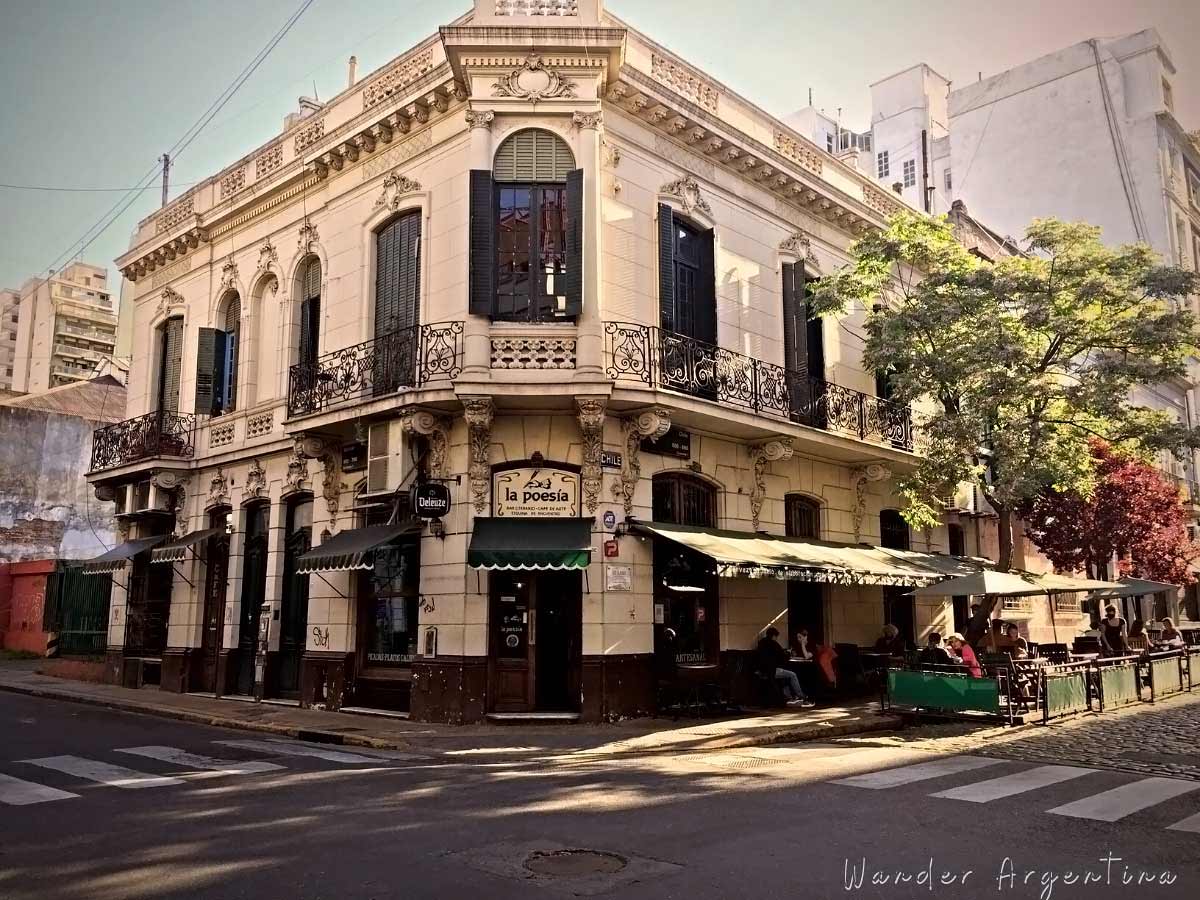To get a feel for the soul of Buenos Aires, it’s necessary to sample a variety of Buenos Aires cafe-eateries for a taste of Porteño life.
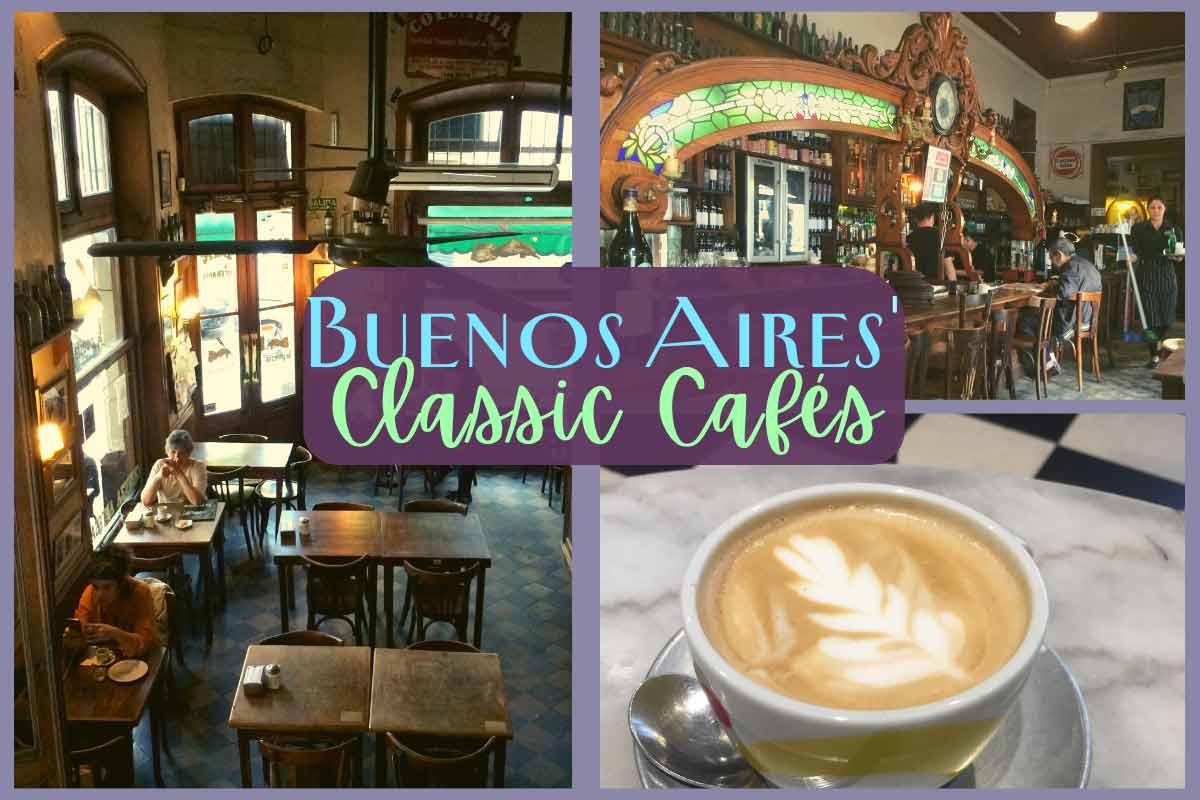
The café-bar restaurants you see on just about every city block in Buenos Aires and towns and cities across the country are communal affairs meant for long hours of lingering and conversation.
In the mornings sleepy-looking suits will stop by on the way to work for the obligatory coffee with medialunas while having a gander at the daily newspaper.
People continue to wander in the corner cafeterías throughout the day for a caffeine fix or quick snack.
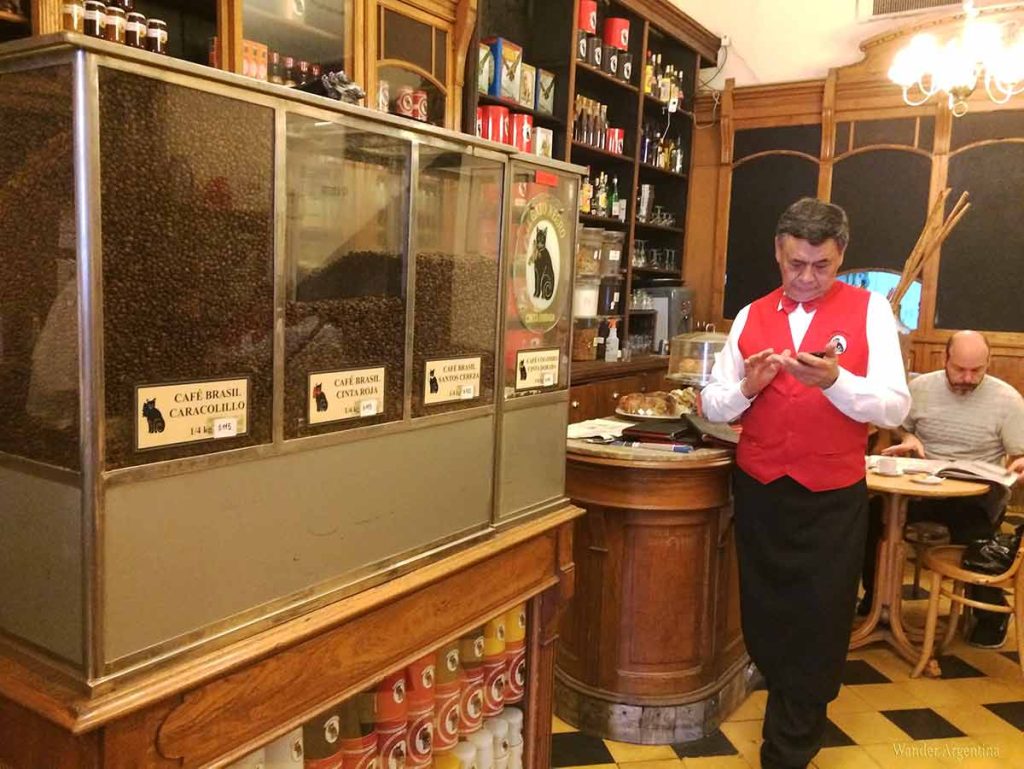
In the late afternoons you can see an interesting snapshot of Argentinean life in the city’s cafés.
The Argentine snack-time: merienda
Afternoon tea time, or Merienda, is a particularly lively time, bringing to the cafes groups of well-dressed gossipy seniors, young couples unafraid to express their affection for each other in public, middle-aged, possibly clandestine couples (often, disturbingly willing to show their affection in public after a visit to another local institution, the telo).
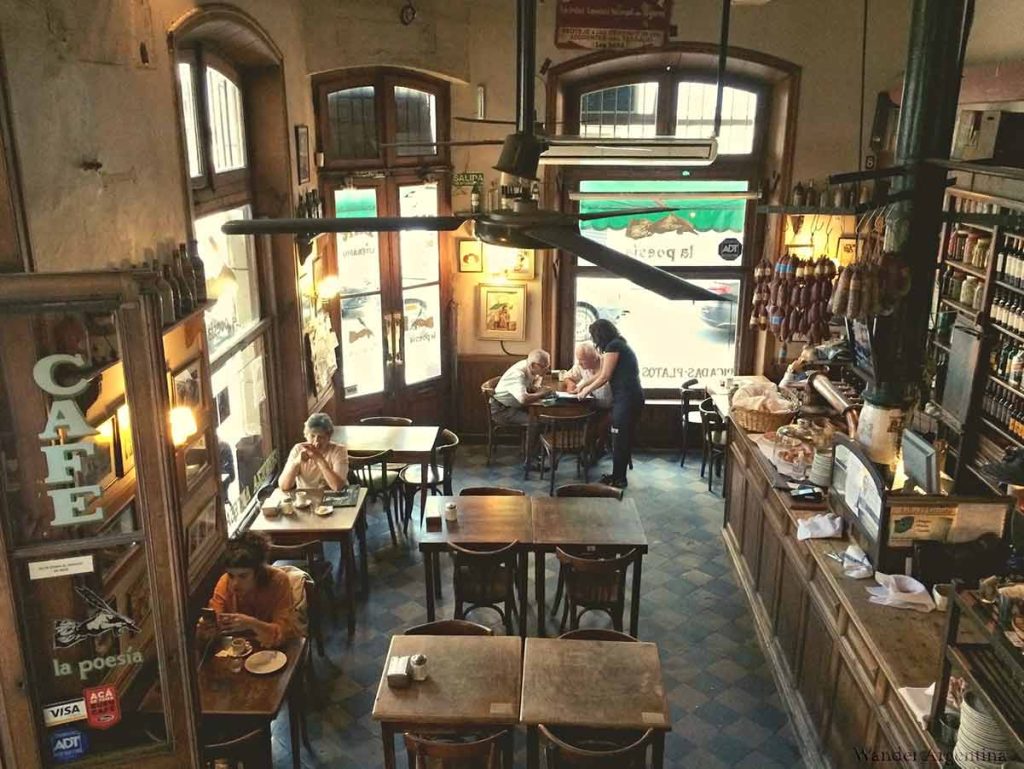
And the same suits who were there in the morning, return for another hit of caffeine or their afternoon tipple.
Grandmothers enjoy a tea and toasted sandwich with their teenage grandkids — a testament to the strength of family in Argentina, and something that you would rarely see in a lot of other countries.
If you walk past a café and see that everybody is staring up at the corner of the room and yelling, they are probably showing a fútbol match featuring one of Buenos Aires many soccer teams on one of the omnipresent TV screens.
Buenos Aires Historic Cafe-Bar Hybrids
One thing to note is that in Buenos Aires, the words ‘bar’ and ‘café’ have become synonymous due to the distinct cultural influences of Argentina’s immigrants.
The usage of the word ‘bar’ in Buenos Aires dates back to the late 19th and early 20th centuries when European immigrants, particularly Italians and Spaniards, brought their coffee traditions to the city.
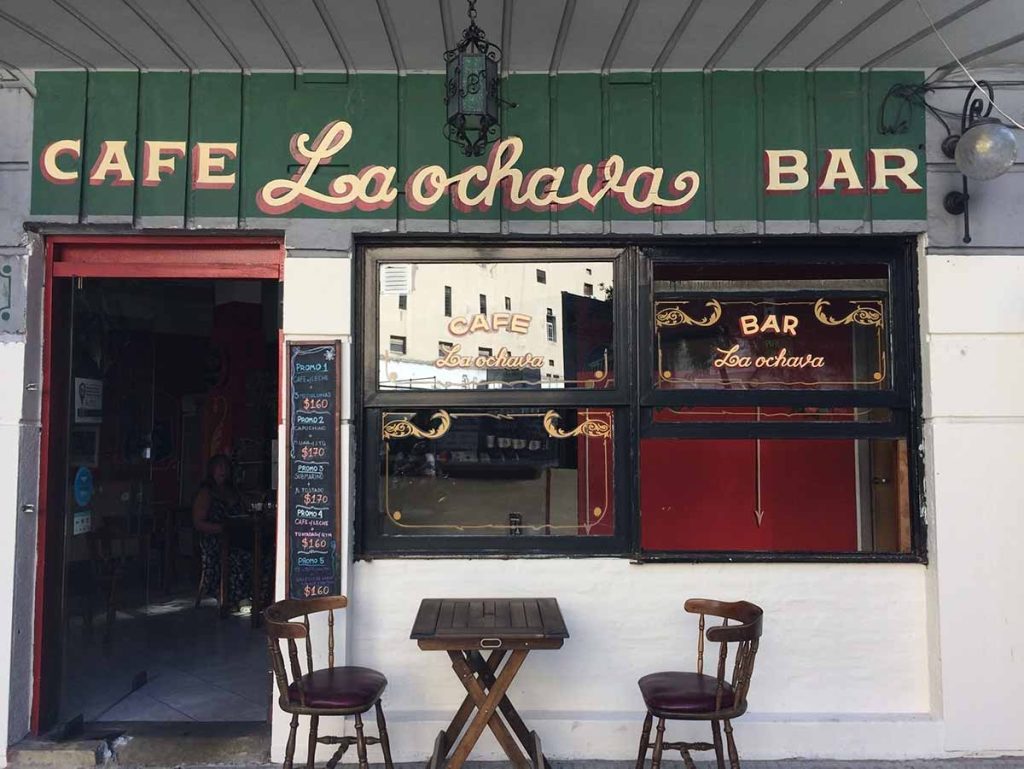
These immigrants opened small establishments that combined elements of a café, bar, and restaurant, creating a unique hybrid space where people could socialize, enjoy a coffee, and have a drink.
On the other hand, the term ‘café’ also found its place in the local vernacular, referring to these same establishments.
This usage aligns with the influence of French café culture that spread globally during the 19th century. The concept of a café, and its association with intellectual discussions, artistic gatherings, and leisurely enjoyment of coffee, resonated with the burgeoning early coffee scene among immigrants in Buenos Aires.
Over time, these establishments became integral to the fabric of Buenos Aires’ social life, serving as meeting places for friends, intellectuals, artists, and politicians.
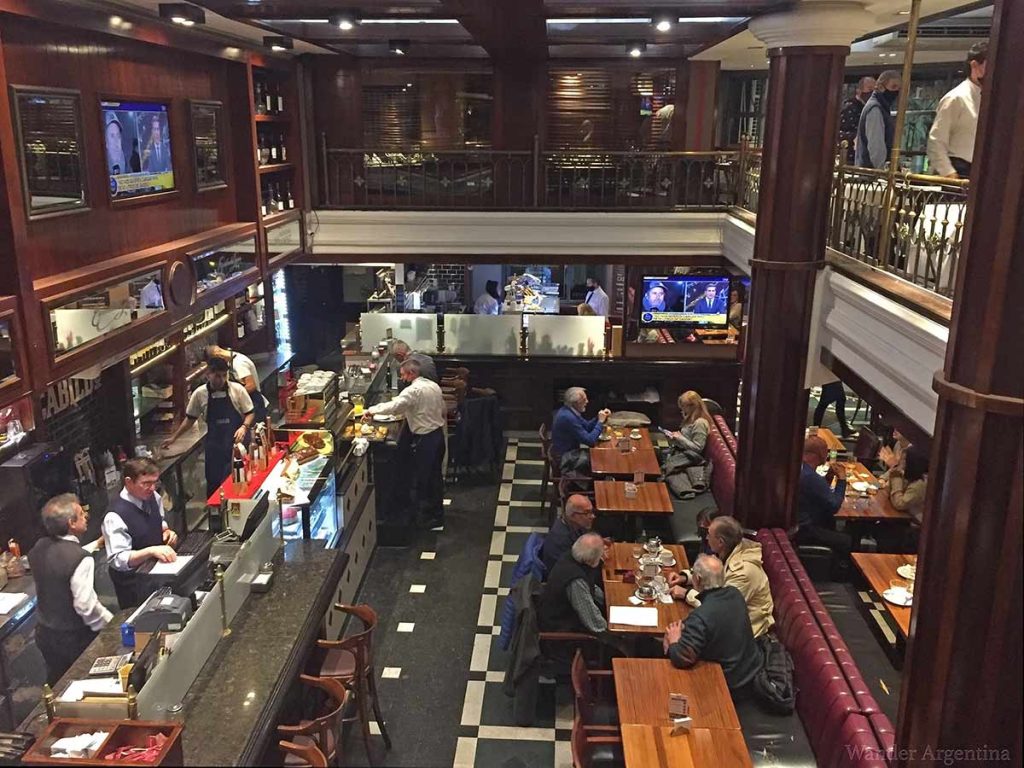
They are known for their lively atmosphere, conversations, and the bustling energy.
The term ‘bar’ became synonymous with these social hubs, representing more than just a place to grab a drink or coffee but a cultural institution where people gathered to connect and engage.
Buenos Aires Historic Cafes
Buenos Aires boasts an collection of more than 70 officially designated historic cafes, known as ‘bares notables,’ which hold significant cultural significance for the city.
These establishments have been meticulously maintained, with their original decor lovingly preserved, transporting visitors to a bygone era.
What to Order at Argentine Cafes
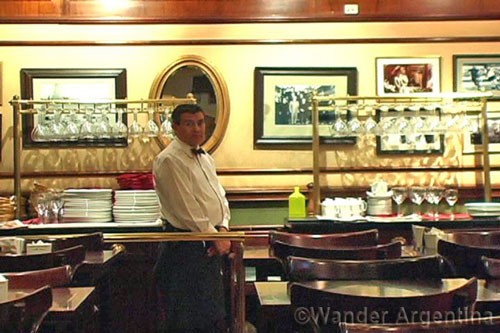
The typical Argentine café menu is virtually identical everywhere in with milanesas (breaded cutlets), empanadas (savory pastries), sandwiches, meat and cheese platters, several staple pasta dishes and a range of typical Argentine desserts.
The food is usually decent, but considering the comparatively high prices, lackadaisical waiters, and generic atmosphere of most cafés, you are better off doing as the locals do and just ordering coffee and snacks and then go elsewhere for a satisfying meal.
The quintessential Buenos Aires café is all about atmosphere and conversation, but a rise in specialty coffeeshops is raising the bar.
One of Argentina’s fanciest historic cafes, Cafe Los Angelitos has a live tango show, which takes place almost every night.

Book the Los Angelitos tango show ➡️
Specialty Coffee in Buenos Aires
When it comes to the quality of coffee in Argentina, the prevailing choice in corner cafeterias and ‘cafes historicos‘ is coffee roasted in the ‘torrado style.’
This is using cheaper beans, with sugar added during processing to reduce bitterness.
While this has been the norm for a long time and is still the only coffee you can find in typical supermarkets throughout Argentina, a shift began in the 2010s in Buenos Aires with the emergence of independent roasters.
Mom-and-pop roastmasters recognized the demand for high-quality coffee within the local market and started importing small quantities of top-quality raw green Arabica beans from various regions worldwide, particularly Colombia, but also Peru, Brazil and Kenya.
As a result, finding top-notch specialty coffee in Buenos Aires is no longer mission impossible, and it’s now possible to get high-quality lattes, flat whites, cold brews and ristrettos.
This elevation of the coffee quality has not only increased the options available but has coincided with the increase of people working remotely in cafes with their laptops.
Many of the newer specialty cafes are set up to accommodate the rise of digital nomads descending on the city and local remote workers.
Conversation over coffee in boutique cafes is not a lost art though and not surprisingly in Latin America’s ‘City of Books‘ you’ll still see café aficionados absorbed in old fashion books.
Coffee lovers in Buenos Aires can now indulge in a diverse range of flavors and experience the artistry that goes into crafting a truly exceptional cup of coffee in the many lovely specialty coffeeshops around the city.
—by Dan Colasimone
20+ Best Buenos Aires Cafés for Coffee Snobs

Truth be told, Buenos Aires’ confiterías are great places to hang out, but for true java junkies, the coffee isn’t that great.
We’re happy to share the best 20+ coffeeshops in Buenos Aires but we only share hidden java gems with our gang — not the whole wide world on the internet.
We don’t want our spots overrun with Instagramers (as happened with Café Tortoni).
When you need your coffee, who wants to wait?
⬇ Sign in to see our list of the 20+ best cafes in Buenos Aires for quality coffee and ambience ⬇
→ Read: FAQ: Dining Out in Argentina: Customs, Cubiertos & Tips
→ Book a Private tour of Buenos Aires’ Cafes or check out our other Buenos Aires Food Tours
→ Read about famous Buenos Aires cafes such as:
Las Violetas Cafe: Elegance in Almagro
Historic and elegant, Las Violetas café, patisserie and restaurant is an essential stop on any Buenos Aires café tour. Now over 125 years old, Las Violetas remains extraordinarily popular. Every…
Libros del Pasaje: A Hip, Cozy Bookstore & Cafe
If you’re looking for a cozy spot to relax, nourish the brain or get some work done after a wild night of partying in Buenos Aires, check out Libros del…
La Poesía: A Literary Cafe in San Telmo
La Poesía is a place to toast the writers of Buenos Aires in a bona fide San Telmo literary venue. Housed in a turn of the 19th century building, the…
Mark’s Deli: N.Y. Style Sandwiches & Coffee in Palermo
Mark’s Deli and Coffee House brings a taste of the Big Apple to the upscale confines of Palermo Soho. What’s on the Menu at Mark’s Here you’ll find stacked made-to-order…

